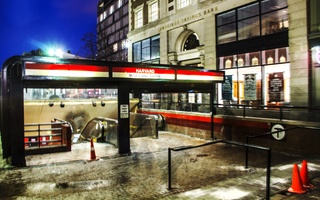Boston University had pledged to fund the final $8.33 million needed to build a new commuter rail station on Harvard-owned property in Allston, according to a letter obtained by The Boston Globe, but the deal was never finalized.
{shortcode-f29217e5eb98bc0bc937f7a49bd493f7ede33ed9}
Announced last September, the “West Station” project will connect Allston to the existing Framingham/Worcester line, which originates at South Station. Harvard and the state had each agreed then to cover one third of the $25 million project cost, but the Massachusetts Department of Transportation was unable to secure a third party to cover the rest of the project.
The letter, acquired by the Globe through a public records request, was written in September of last year by Boston University President Robert A. Brown and directed to former Massachusetts Governor Deval L. Patrick ’78. According to the Globe, the letter stated that the university was “prepared to help fund the construction of West Station” pending further discussion and an agreement that would prevent cars and buses from using the university’s West Campus to reach the station.
BU spokesperson Colin D. Riley told The Crimson that the state and the university have not finalized the agreement, and need to have further discussions about the impact the project would have on surrounding neighborhoods.
Responding on behalf of the Baker administration, MassDOT spokesperson Michael Verseckes wrote in an emailed statement to The Crimson that the state “welcome[s] any opportunity to engage in a discussion about transportation public-private partnerships beneficial to our local communities and educational institutions.”
Verseckes also wrote that the administration’s immediate concern is “getting the current commuter rail system running on a regular schedule,” after historic snowfall this winter caused multiple shutdowns of many MassDOT public transit services.
Allston resident Richard Parr ’01 said the letter’s revelation was not particularly surprising.
“If you look at the kind of value that this station could unlock...I think it’s natural that big institutions would want to have their own lines of communication—but it’s ultimately up to the city and state to balance that and the interests of the people,” he said.
—Staff writer Ignacio Sabate can be reached at ignacio.sabate@thecrimson.com . Follow him on Twitter @TheIggySabate.
—Staff writer Luca F. Schroeder can be reached at luca.schroeder@thecrimson.com. Follow him on Twitter @lucaschroeder.
Read more in News
Admissions Lawsuit Plaintiff Pens Letters Blasting Record PurgesRecommended Articles
-
West Station: On the Right TrackAs Massachusetts Transportation Secretary Richard A. Davey said at the station’s opening, “It’s about a neighborhood.”
-
 Boston City Councilors File Resolution in Support of Late-Night T
Boston City Councilors File Resolution in Support of Late-Night T -
No Progress Made Towards Funding Allston’s West StationIt remains unclear whether Boston University will follow through with funding a third of West Station in Allston alongside Harvard and the state government.
-
E-Tolling Paves Way for I-90 Realignment in AllstonThe Massachusetts Department of Transportation switched to all-electronic tolling on the Mass. Turnpike last week, paving the way for the realignment of the I-90 interchange in Allston and opening up land for potential Harvard development.
-
MassDOT Updates Plan to Straighten Highway on Harvard-Owned LandOfficials from the Massachusetts Department of Transportation detailed updates to the agency’s plans for straightening a portion of Interstate 90 that will cross Harvard-owned land in Allston during a public meeting Thursday.













